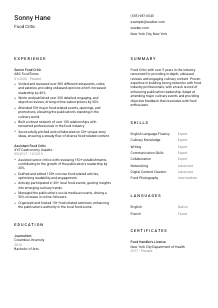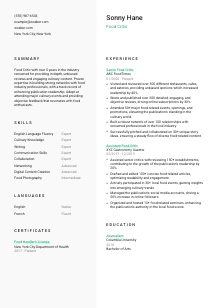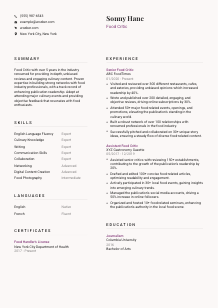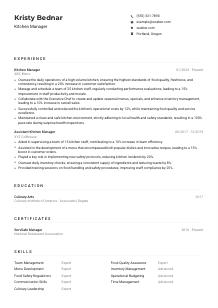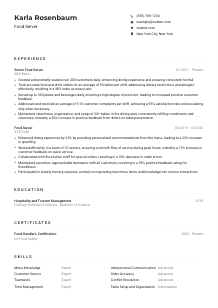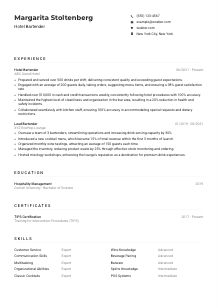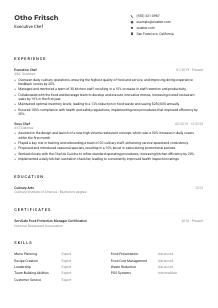Food Critic CV Example
Sampling flavors, but your CV feels bland? Savor this Food Critic CV example, seasoned with Wozber free CV builder. Discover how to articulate your gastronomic expertise to meet editorial expectations, making sure your career path is always as tasteful and enticing as the dishes you describe!

How to write a Food Critic CV?
Hello, budding Food Critic! Embarking on a career as a Food Critic is both exciting and daunting. Your CV is not just a document; it's a testament to your gastronomic journeys and analytical prowess. Here, we'll guide you through crafting a CV that's as gratifying as a Michelin-star meal, using Wozber's free CV builder. This is your first step towards landing that dream Food Critic role. Let's pepper your CV with the flavours of your experiences and skills!
Personal Details
The 'Personal Details' section of your CV sets the stage. It's your first impression, so let's make it count.
1. Name as Your Brand
Think of your name as the crown on the CV. Ensure it's prominent, ideally at the top, in a clear, readable font. Your name is not just a label; it's the umbrella brand for all your delicious achievements.
2. Job Title Alignment
Position yourself right from the start by mirroring the job title 'Food Critic' beneath your name. This shows alignment and immediately tells the hiring manager that you're a perfect fit.
3. Essential Contact Info
Ensure your contact details are easy to find and correct. A missing digit in a phone number or a typo in an email address can mean a missed opportunity. And while we're at it, listing 'New York City, New York' shows you're already in the heart of the culinary scene or willing to be.
4. Digital Presence
In a profession where your reviews and articles might be scattered across the digital universe, including a professional website or LinkedIn profile can offer a one-click buffet showcasing your work to potential employers.
5. Conciseness & Relevance
Skip the appetizers – age, marital status, and photo aren't required here. Let's stick to the main course, ensuring every detail about you is relevant and adds value to your 'Food Critic' persona.
Takeaway
Your personal details section is like the inviting aroma of a well-prepared meal; it makes the hiring manager want to dive deeper. Precision and clarity here set the tone for the rest of your CV.





Experience
Your 'Experience' section is where the flavors of your career come alive. As a Food Critic, your experiences are vast and varied, a palette of tastes and insights.
- Visited and reviewed over 300 different restaurants, cafes, and eateries, providing unbiased opinions which increased readership by 40%.
- Wrote and published over 200 detailed, engaging, and objective reviews, driving online subscriptions by 30%.
- Attended 50+ major food‑related events, openings, and promotions, elevating the publication's standing in the culinary world.
- Built a robust network of over 100 relationships with renowned professionals in the food industry.
- Successfully pitched and collaborated on 30+ unique story ideas, ensuring a steady flow of diverse food‑related content.
- Assisted senior critics with reviewing 150+ establishments, contributing to the growth of the publication's readership by 20%.
- Drafted and edited 100+ concise food‑related articles, otimizing readability and engagement.
- Actively participated in 30+ local food events, gaining insights into emerging culinary trends.
- Managed the publication's social media accounts, driving a 50% increase in online followers.
- Organized and hosted 10+ food‑related seminars, enhancing the publication's authority in the local food scene.
1. Dissecting Job Requirements
Begin by breaking down the provided job description. Highlight experiences that directly match responsibilities like ‘visited and reviewed a variety of restaurants' and ‘built a strong network within the food industry.' This attention to detail fishbones your CV with relevance.
2. Roles and Responsibilities
Lay out your professional journey in a clear, chronological order, starting with your latest role. Be it ‘Senior Food Critic' or ‘Assistant Food Critic,' each title should reflect your level of expertise and responsibility.
3. Tailor-made Achievements
For each role, don't simply list duties; serve up your accomplishments. Perhaps you ‘Increased readership by 40%' through your insightful reviews. These quantified achievements are the Michelin stars of your CV.
4. Quantify Where You Can
Quantifiable achievements are like the perfect seasoning, they enhance and give depth. Whenever you can, include numbers – like ‘reviewed over 300 restaurants' or ‘drove a 30% increase in online subscriptions.' Numbers tell a story of impact and scale.
5. Crisp and Relevant
Resist the urge to list every job you've ever had. Think of your CV as a curated menu; only include roles that highlight your journey and qualifications as a Food Critic.
Takeaway
Craft your experience section like a carefully composed dish, balancing flavors of achievements and responsibilities. This is where you prove you're not just a participant in the culinary world, but a connoisseur.
Education
While your experience flavors your CV, your academic background is the base. It's where your fundamental skills were honed.
1. Identify Key Requirements
The job description asks for a ‘Bachelor's degree in Culinary Arts, Journalism, or a related field.' Ensure your degree is front and center, making it clear you meet this essential criterion.
2. Structure with Clarity
Your ‘Education' section should be a clear, concise list. Start with your degree, followed by the institution and graduation date. This straightforward approach ensures the hiring manager can quickly verify your academic credentials.
3. Tailoring Degree Details
If you hold a degree in ‘Journalism,' as our example does, make sure it's listed exactly as such, aligning perfectly with the job criteria. This mirroring technique reinforces your suitability.
4. Course Highlights
Though the broader degree may cover the essentials, citing specific courses relevant to the Food Critic role can add depth. Whether it's ‘Food Writing' or ‘Culinary History,' these details add layers of interest.
5. Additional Academic Achievements
Graduated top of your class? Part of the culinary club? Include these details if they add value to your Food Critic narrative. They're the garnishes that make your education section more appealing.
Takeaway
Your education section lays the foundation of your CV, grounding your practical experiences with theoretical knowledge. Present it thoughtfully, ensuring it attests to your qualifications for the Food Critic role.
Certificates
In the culinary world, certifications can be the cherry on top. They validate your skills and commitment to your craft.
1. Matching Job Requirements
The example job description mentions a ‘Food Handler's license.' If you have this or any other relevant certification, like wine tasting or food safety, list it to show you're not just about taste but also about compliance and safety.
2. Quality Over Quantity
Focus on certifications that align directly with the Food Critic role. It's like choosing ingredients for a dish; pick the ones that will enhance and complement your CV flavor profile.
3. Dates Matter
Especially for certifications with expiry dates, like the ‘Food Handler's License,' including the date shows you're up-to-date and serious about maintaining your professional standing.
4. A Commitment to Learning
In an ever-evolving field like culinary arts, showing you're continuously enhancing your skills through certifications can set you apart. It's evidence of your dedication to culinary excellence.
Takeaway
Your certifications are the accolades that not only complement your experience and education but also showcase your ongoing commitment to your profession. They're your CV's Michelin guide stars.
Skills
Your skills section is a carefully curated menu of your professional repertoire. Let's make sure it's well-seasoned.
1. Extracting Job Skills
First, tease out both explicit and implicit skills from the job description, like ‘strong knowledge of different cuisines' and ‘exceptional writing skills.' Your CV should reflect these as clearly as the aromas of a fine wine.
2. Perfect Pairings
Match your hard and soft skills to those requested, ensuring you cover both technical (e.g., ‘culinary knowledge,' ‘food photography') and soft skills (e.g., ‘writing,' ‘communication'). This demonstrates a balanced skill set, prepared to tackle the demands of a Food Critic's palate.
3. The Art of Selection
Like plating a dish, presentation is key. List your skills in a clean, organized manner, focusing on those most relevant to the Food Critic position. This not only makes for easy reading but also highlights your expertise where it matters most.
Takeaway
Consider your skills section the flavor profile of your CV; it must be harmonious yet distinct. Show the hiring manager that your blend of culinary insights and articulate expression is exactly what they've been craving.
Languages
In a role that may span cultures and cuisines, being multilingual can be a distinct advantage. Let's showcase your linguistic palette.
1. Recipe for Requirement
Analyze the job description for language requirements. The ability to ‘handle English language tasks efficiently' should be highlighted as your main linguistic ingredient.
2. Adding More Flavors
If you're fluent in additional languages, like French in our example, include these to show your versatility. It's like being able to critique both a croissant and a cronut with equal flair.
3. Clarity in Proficiency
Be clear about your level of proficiency in each language, using terms like ‘Native,' ‘Fluent,' or ‘Basic.' It's important to set the right expectations, much like categorizing the heat level of a spicy dish.
4. The Global Critic
Even if the role isn't explicitly international, mentioning your linguistic abilities can set you apart, signaling that you're a Food Critic with a global palate and understanding.
5. The Power of Communication
Remember, your linguistic skills aren't just about translation; they're about deepening connections and comprehension across culinary cultures. This global fluency makes you an invaluable asset to any culinary publication.
Takeaway
Like a well-traveled Food Critic who's sampled tastes from around the globe, your linguistic abilities enrich your CV, adding layers of flavor and depth to your professional narrative.
Summary
Your summary is your CV's amuse-bouche; it offers a tantalizing taste of your profile. It's time to make mouths water.
1. Savor the Role
Digest the job description thoroughly. A summary that reflects skills and experiences pertinent to being a Food Critic (like your ‘in-depth, unbiased reviews') will captivate from the get-go.
2. A Taste of Your Career
Begin with an appetizing opening line, introducing yourself as a Food Critic. Use your career highlights and unique offerings as the main ingredients in this section.
3. Infusing Key Ingredients
Spoon-feed the hiring manager your most relevant skills and achievements. This isn't just about stating facts; it's about flavoring your summary with the essence of your career achievements.
4. Brevity & Impact
Like a crisp, fresh salad, your summary should be brief yet impactful. Aim for 3-5 lines that encapsulate your essence as a Food Critic. Leave them craving more, turning to the rest of your CV with anticipation.
Takeaway
Consider your summary the invite to a delectable dining experience - your career. Spice it up with your unique skills and experiences, making it irresistible. As you tailor your CV for a specific Food Critic role, remember that Wozber's free CV builder, with its ATS-friendly CV templates and ATS CV scanner, is your sous-chef in this endeavor. Let's cook up a CV that lands you at the critics' table.
Launching Your Food Critic Journey
Congratulations, aspiring Food Critic! You've now blended the perfect ingredients for a CV that's both captivating and ATS-compliant. With this blueprint, and Wozber's free CV builder at your side, you're well-equipped to create a CV that not only passes the ATS screening but also entices hiring managers with your culinary prowess and writing finesse.
Embark on your journey with confidence, and let your CV be the key that unlocks a world of tastes and experiences. Bon appétit on your career journey!

- Bachelor's degree in Culinary Arts, Journalism, or a related field.
- Minimum of 5 years of experience in the food industry, preferably in culinary or journalism roles.
- Strong knowledge of different cuisines, cooking techniques, and food trends.
- Exceptional writing and communication skills, with the ability to provide detailed and objective feedback.
- Must have or be willing to obtain a valid Food Handler's license or equivalent certification, if required by local regulations or commonly mentioned in job ads.
- Must be able to handle English language tasks efficiently.
- Must be located in or willing to relocate to New York City, New York.
- Visit and review a variety of restaurants, cafes, and eateries, providing unbiased opinions on the quality, presentation, and taste of the food.
- Write detailed, engaging, and objective reviews for publication in print or digital media.
- Attend food-related events, openings, and promotions to stay updated with the latest in the culinary world.
- Build a strong network of relationships with professionals in the food industry, including chefs, restaurateurs, and fellow critics.
- Pitch story ideas, collaborate with editors, and ensure the timely delivery of reviews and other food-related content.





